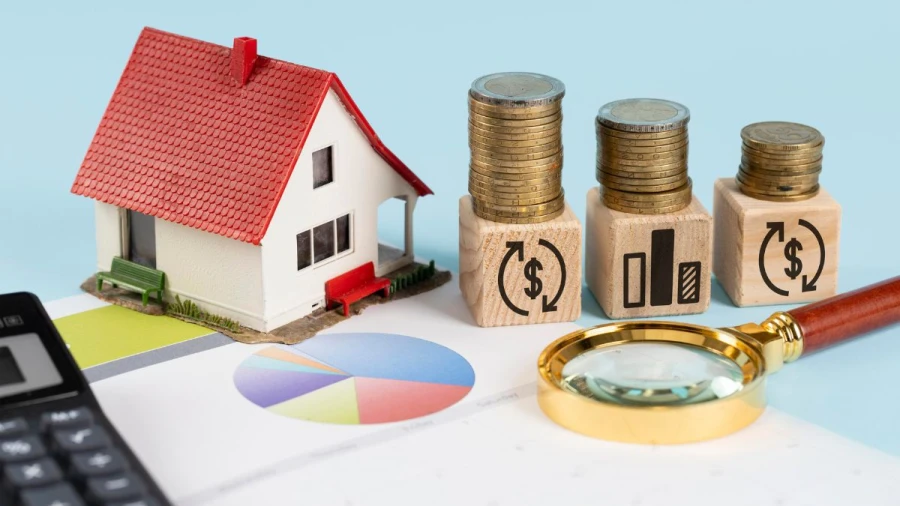
When Will Mortgage Rates Go Down? Will Mortgage Rates Go Down in 2024?
Mortgage rates might go down in the second half of 2024, especially if the Federal Reserve lowers interest rates to control inflation. However, it's uncertain and depends on economic factors and some experts suggest it could be more favorable for homebuyers in 2024.
Updated Nov 27, 2023
On This Page
What is Mortgage Rates?
A mortgage rate is the interest percentage charged for a home loan. This rate is subject to change based on prevailing economic conditions. However, the specific mortgage rate offered to a home buyer is determined by the lender and depends on individual factors such as credit history and financial circumstances.
When applying for a mortgage, consumers typically choose between a fixed-rate mortgage or a variable-rate mortgage. A fixed-rate mortgage maintains a constant interest rate throughout the entire mortgage term, providing predictability for monthly payments. On the other hand, a variable-rate mortgage's interest rate may fluctuate in response to changes in national borrowing costs, leading to adjustments in the borrower's monthly payments.
To stay informed about trends in mortgage rates, potential homebuyers often monitor key indicators such as the prime rate and the 10-year Treasury bond yield. These indicators offer insights into broader economic conditions, helping borrowers anticipate potential changes in mortgage rates and make informed decisions about the timing of their home purchase or refinance.
When Will Mortgage Rates Go Down?
Mortgage rates were initially anticipated to decrease in 2023, but they have remained higher for a more extended period than expected due to the ongoing strength of the U.S. economy, reaching nearly 8% as of early November. The baseline projection suggests that the 30-year fixed mortgage rate is likely to stay above 7% for the rest of 2023 and remain above 6% throughout 2024.
This trend is influenced, in part, by the Federal Reserve's hawkish monetary policy, emphasizing the intention to keep rates elevated to address inflation and meet the central bank's 2% annual target. The continuous increase in mortgage interest rates is attributed to the robust jobs market, contrary to earlier predictions by the Federal Reserve regarding the impact of their tightening campaign on unemployment rates. As of now, the unemployment rate stands at 3.8%, unchanged from the previous month.
Read More >> How to Choose the Best Mortgage? What is the Most Popular Mortgage Type?
Will Mortgage Rates Go Down in Nov 2023?
The outlook for mortgage rates in November 2023 varies among experts. While some expect rates to continue exceeding 7% and potentially climb higher due to anticipated Federal Reserve actions, others foresee rates hovering between 6.5% and 7.5%.
A potential noticeable decrease in rates could occur if the Federal Reserve signals the end of its tightening cycle, leading to increased home buying activity. The impact of a Fed hike of 25 basis points may cause slight increases in mortgage rates. Overall, there is an expectation that rates will gradually normalize over time, but uncertainty persists regarding the timing of these adjustments.
Chart your financial course with MarketsHost, your guide to a prosperous future. Explore, navigate, and succeed.
Will Mortgage Rates Go Down in 2024?
The prediction for mortgage rates in 2024 suggests the possibility of some relief for borrowers. While an immediate drop in rates may not be anticipated at the start of the year, expectations lean towards steady rates followed by a potential decrease in the second half of 2024.
Factors influencing this outlook include the Federal Reserve's potential decision to cut the federal funds rate, which could lead to lower mortgage rates in the latter part of the year. Despite the current high-rate environment, there is speculation that the Federal Reserve may implement rate cuts in 2024 to address inflation concerns, potentially resulting in more favorable mortgage rates, possibly falling below 7%.
How Long Will Interest Rates Stay High?
The duration for which interest rates will remain high is uncertain, and predictions vary among economists. Some, like Preston Caldwell, a senior U.S. economist, suggest that rates may start to decrease in early 2024, anticipating a slowing economy and inflation nearing the Federal Reserve's 2% target. This aligns with projections from the Federal Open Market Committee (FOMC) indicating stable or higher rates through 2023 before a gradual decline in 2024–2025.
However, Elliot Eisenberg, Chief Economist at Graphs and Laughs, emphasizes the complexity of economic dynamics, noting that the anticipated interest rate cooling in 2023 may not materialize, and any changes may take time to manifest in the economy. Overall, predicting the exact duration of high interest rates remains challenging, as it depends on various economic factors and the Federal Reserve's decisions.
Read Related >> Types of Loans for Mortgages, What are Other Types of Home Loans?
Why Do Mortgage Rates Predicted to Stay High?
Persistently high mortgage rates result from the Federal Reserve's efforts to combat inflation and bring it back to the 2% target, despite a robust economic environment and increasing interest rates.
The Fed raised the federal funds rate multiple times in 2022 and 2023, totaling eleven increases, contributing to the current elevated mortgage rates. While it's uncertain if the Fed will raise rates further in 2023, the decision to maintain rates at 5.25% to 5.5% during the November meeting suggests a potential pause before considering rate cuts in the second quarter of 2024.
The large spread between the 30-year fixed mortgage rate and the yield on 10-year Treasury bonds also plays a role in today's high mortgage rates. Historically, this spread is around 1.7 percentage points, but it has widened to nearly 3 percentage points due to heightened investor volatility, further impacting the cost of borrowing for homebuyers.
Is 2023 an Ideal Time to Refinance?
With mortgage rates significantly higher than the record lows seen in 2020 and 2021, 2023 may not be the ideal time to refinance for those who secured mortgages during the low-rate period. Refinance and purchase applications have remained low, reflecting the current interest rate environment. The average rate for new refinance loans in the first half of 2023 was 6.4%, compared to 4.2% for the original loan, contributing to the subdued refinancing activity.
Those opting for refinancing are primarily doing so to access home equity, with cash-out refinances constituting nearly 90% of conventional refinance originations. Despite a significant percentage of homeowners sitting on equity-rich properties, Freddie Mac predicts that refinance activity will continue to be limited throughout the year.
It's essential for individuals considering refinancing to carefully evaluate the overall impact on their finances, as obtaining a lower interest rate might result in an extended loan term and potentially higher overall interest costs.
When Will Mortgage Rates Go Down - FAQs
1. When will mortgage rates go down in 2023?
Predictions vary, but some experts anticipate a drop in the second half of the year due to potential Federal Reserve rate cuts.
2. What factors influence mortgage rate changes?
Mortgage rates are influenced by economic conditions, the Federal Reserve's decisions, inflation, and global financial markets.
3. Is 2023 an ideal time to refinance my mortgage?
Refinancing may be less favorable in 2023 due to higher rates, but individual circumstances and goals should be considered.
4. Why are mortgage rates predicted to stay high?
Stubbornly high rates are attributed to the Federal Reserve's efforts to control inflation, multiple rate hikes, and market volatility.
5. How long will interest rates stay high?
Predictions vary, with some economists suggesting rates could start decreasing in early 2024, depending on economic indicators and Federal Reserve actions.




